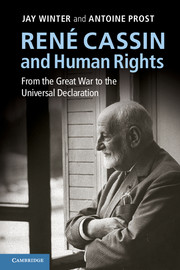Book contents
- Frontmatter
- Contents
- List of plates
- Preface and Acknowledgments
- Introduction to the English edition
- List of Abbreviations
- Part I In the shadow of the Great War
- Part II The jurist of Free France
- Part III The struggle for human rights
- 9 The Universal Declaration of Human Rights: origins and echoes
- 10 The vice-president of the Conseil d’Etat, 1944–1960
- 11 A Jewish life
- Conclusion
- An essay on sources
- Index
- Plate section
- References
10 - The vice-president of the Conseil d’Etat, 1944–1960
Published online by Cambridge University Press: 05 April 2013
- Frontmatter
- Contents
- List of plates
- Preface and Acknowledgments
- Introduction to the English edition
- List of Abbreviations
- Part I In the shadow of the Great War
- Part II The jurist of Free France
- Part III The struggle for human rights
- 9 The Universal Declaration of Human Rights: origins and echoes
- 10 The vice-president of the Conseil d’Etat, 1944–1960
- 11 A Jewish life
- Conclusion
- An essay on sources
- Index
- Plate section
- References
Summary
By tradition in France, the Conseil d’Etat is the highest administrative body in the land. The nomination of Cassin as vice-president, that is, as its effective president, would have been inconceivable in other times. Before him and after him, every vice-president had been a member of this council. He was the only ‘foreigner’ to be so honoured. The only reason the Conseil d’Etat did not protest against this imposition was because it had lost a substantial part of its authority. Nominating as its head not only a distinguished jurist but also a leader of Free France from the beginning, de Gaulle made clear his intention of purging and reforming it.
While Cassin may not have been welcomed, he wound up being accepted over time. He was not responsible for the purging of the Conseil d’Etat, which was done directly by the Ministry of Justice and by a committee of which he was not a member. He did not enter into office until this purge had been completed. It was more severe than in other high administrative bodies for a simple reason: it was a reservoir in which ministers found their closest advisors and higher civil servants. Vichy’s ministers continued this practice and gave to many members of the Conseil d’Etat political as well as technical responsibilities. One instance is that of the general secretary of the Ministry of Justice; another was the president of the committee which dealt with denaturalizations.
- Type
- Chapter
- Information
- René Cassin and Human RightsFrom the Great War to the Universal Declaration, pp. 265 - 300Publisher: Cambridge University PressPrint publication year: 2013



